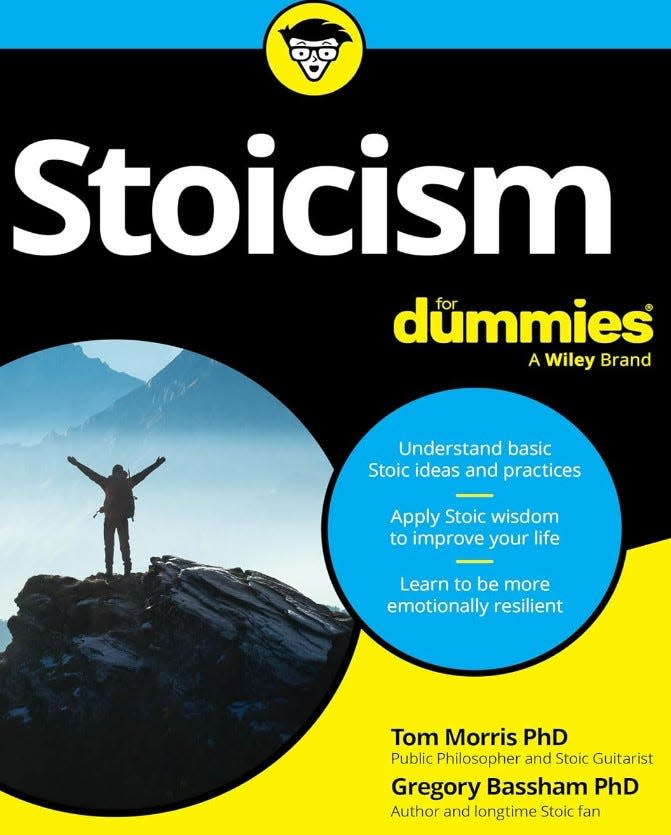Wilmington business leader co-writes another book for 'Dummies'

Since retiring from the University of Notre Dame, North Carolina native Tom Morris has made it his business to take philosophy off campus and into the everyday world.
Through his Wilmington-based Morris Institute for Human Values, he's given talks and retreats to hundreds of corporations and government agencies. Plus, he's written a shelf of books, including "If Aristotle Ran General Motors," "If Harry Potter Ran General Electric," "The Everyday Patriot," "Plato's Lemonade Stand" and even "Philosophy for Dummies."
"Stoicism for Dummies," which he co-wrote with fellow philosopher Gregory Bassham, is a bit of a follow-up to that last book. It focuses on a school of ancient philosophy that's enjoying a bit of a revival.
What kind of a revival? Well some Stoic writers, such as Marcus Aurelius, the Roman philosopher-emperor, never really went away. However, a number of modern writers in recent years -- such as Pierre Hadot in "The Inner Citadel" and William R. Irvine ln "A Guide to the Good Life" -- have tried to adapt Stoicism to our times.
There are even Stoic blog posts and podcasts. Morris and Bassham offer a list.
What is a Stoic? Basically it refers to followers of Zeno of Citium, a merchant-turned philosopher, based in Athens a generation or two after Plato and Aristotle. (A stoa, in Greek, is a covered portico; Zeno gave his talks and seminars in a stoa near that Athenian marketplace.)
Zeno had many followers, the most famous of whom happened to be practical Romans: Marcus Aurelius, the slave-turned teacher Epictetus and Seneca, a Roman senator who had the unenviable task of tutoring the young Nero.
Morris covered some of this territory previously in his 2004 book, "The Stoic Art of Living."
What did they believe? Well -- a bit surprisingly, since many gained rank and power -- Stoics felt that people should not chase after money or fame or popularity but the improvement of the self.
Their four cardinal virtues, fairly consistently through the ages, were self-control (and reining in the passions), the pursuit of wisdom, courage and the pursuit of justice.
Stoics such as Marcus Aurelius and Seneca lived simple lives. The early Stoics weren't Christian; they revered an all-encompassing power they knew as "Logos," or The Word. Yet. like the Serenity Prayer, they emphasized the calm acceptance of those things in life which cannot be changed.
Stoicism is sometimes seen as a counterpoint to the teachings of the Greek philosopher Epicurus, from about the same time as Zeno, who taught that pleasure is the object of life. Sen. Josh Hawley of Missorui, in his recent book "On Manhood," attributed most of America's problems to Epicurus, although his doctrine -- which emphasized moderate living and the contemplation of the good, rather like Stoics -- is very different from the hedonism that the senator had in mind.
Perhaps the ultimate Stoic of modern pop culture is Mr. Spock: eerily calm and unemotional (except during mating season), devoted to knowledge, loyal and brave. Surprisingly, Spock and the Vulcans come up only once in "Stoicism for Dummies." But Morris and Bassham are hurrying on to other points.
"Stoicism for Dummies" is written in a plain, straightforward style; you don't have to be a grad student to read and enjoy it, though you will have to think.
Like Socrates (whom the Stoics revered), the authors pose questions and break things down. They pursue paradoxes and contradictions, both in the ancient writers and their modern disciples.
They make no final prescriptions, but leave conclusions up to the reader, perhaps to build his or her own personal values and to adapt what is useful. The moral might be that philosophy is still very much worth thinking about.
Stoicism for Dummies
By Tom Morris and Gregory Bassham
John Wiley and Sons, $24.99 paperback
This article originally appeared on Wilmington StarNews: 'Stoicism For Dummies' combines ancient philosophy and pop culture

